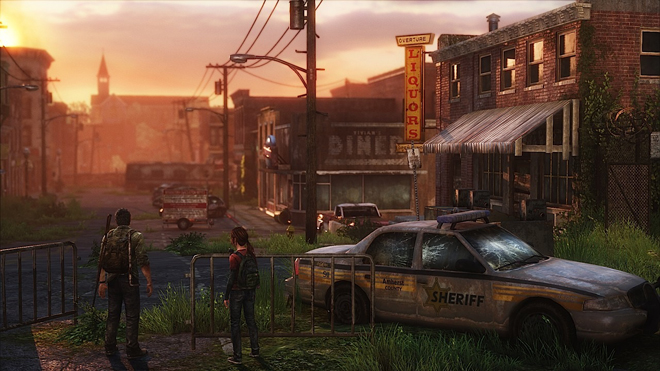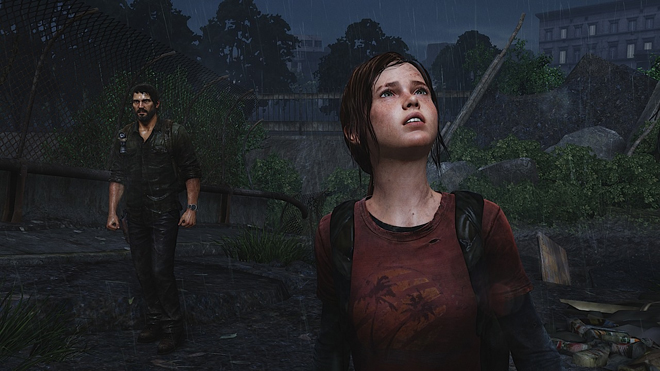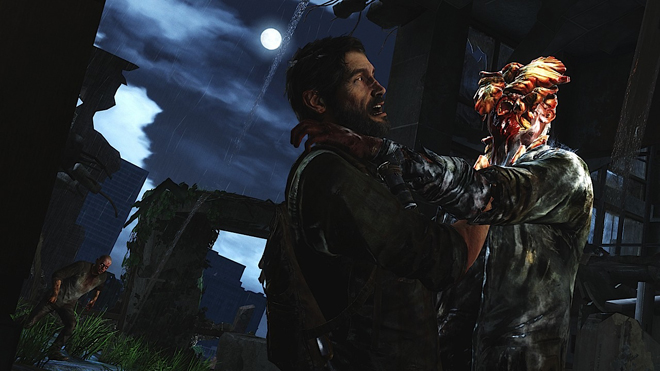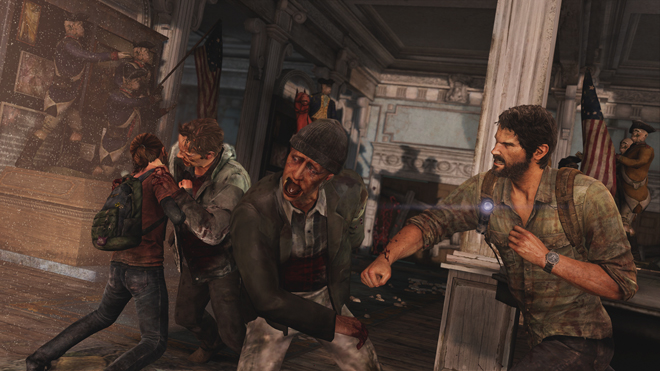The Last of Us — Human Misfortune

In the era of digital media and marketing we currently reside in, it’s nigh-impossible to go into a new video game (or movie, for that matter) without preconceived notions on how it could turn out. It was one of the biggest ostensible hindrances for Naughty Dog and Sony’s The Last of Us, releasing in an era where reviews (some of which are professional, and damn well should know better) for AAA games love to slather the text with hyperbolic statements. Saying it’s the best game you’ve played all year is perfectly fine. Saying it’s akin to gaming’s Citizen Kane moment is stupid.
But that begs the question: is this game even good? As video games get more expensive to develop, publishers are having them aimed at bigger audiences. We had to start getting used to a flood of linear, set-piece driven cinematic experiences, though we’re seeing an interesting move towards open world titles as of this E3. Thank Naughty Dog’s Uncharted series for getting that train rolling, but TLOU was planned to usurp that trend by presenting a more open (but not open world) experience. It would be one befitting of its tone, with the developer going from a fun adventure to a post-apocalyptic world laden with tragedy. It’s incredibly easy to go into AAA games these days skeptical of how they’ll turn out, because of the hyperbole surrounding them these days, but that’s not fair to all of them.
And TLOU, thankfully, is one of the exceptions. In reality, it’s actually a very gutsy project on the developer and publisher’s part. Here we have a single-player-focused new IP that doesn’t adhere to today’s common trends, releasing at the end of the console generation. But it was successful because it works as an experience. It’s a title that doesn’t feel like it has to hold your hand for a significant amount of time. Though that’s not saying all of that Sony marketing power wasn’t a big help.

Even post-apocalyptic games have scenery porn.
TLoU begins with tragedy right from its outset, letting you know what you’re in for. You’ll see most of the game through the eyes of its protagonist, Joel, but the prologue provides necessary exposition to show how the country was ruined. The prologue takes place in our current year of 2013, with Joel at home with his daughter. The virus outbreak is occurring all over the country, but finally reaches their location in Central Texas. This forces its many inhabitants to abandon it, due to being quickly overrun by infected human beings. Time subsequently shifts to how the world looks 20 years later, this time in Boston, Massachusetts. Joel and a bunch of human allies are still surviving, but the virus has taken its toll on the human population and the environment, making certain landmarks of the world almost unrecognizable.
As the game’s cover and above banner imply, Joel rarely travels alone. He goes through many companions through the course of the game, but the main one is, Ellie. Joel’s been tasked with escorting her through a sizable portion of the country, so she’s in it for the long haul. They aren’t father and daughter, but you’d think they were by the way their relationship develops. We’ve had a peculiarly-high number of games released this year that deal with some form of parenthood, that all happened to coincidentally release in the same period. TLoU develops that realistically, even if the relationship is an ersatz one.

It’s a long journey from here.
Don’t get confused by my use of the word “escort,” as the game thankfully doesn’t force you to babysit. Like the Uncharted games, your companions can’t die under most circumstances — as in, there are points when they’re grabbed by enemies, where you’ll have a few seconds to free them, but that rarely happens. They also won’t get spotted by enemies despite sometimes walking in plain sight. The only one that can get the enemy’s attention is you. They’re often very helpful if you’re in a pinch, too. The game demonstrates how AI companions should act in games, and others should take notes.
As mentioned before, the developers said TLoU is more open than any of their previous games, but you wouldn’t think so in the opening hours. It initially follows a modern game design guidebook, in teaching the player how to get through certain situations the game presents. But it’s not like Uncharted in more ways than one: you can’t go through the game guns blazing. No, stealth is necessary in some cases to get a good advantage over the opposition. Ammo and weapons are a scarce commodity, best used as a last resort when in a pinch. That applies to your human opponents, who tend to wander around in big numbers later in the game, but goes double for the infected humans. Some infected can instantly kill a character if they get ahold of them. That goes for the AI accomplices too, though you’ll have time to help them before they’re bitten. That doesn’t happen enough to become annoying.

Don’t let this happen to you.
Having a series of tutorial-like areas at the beginning of the game is fine, but the game’s structure becomes monotonous around 33% of the way through. There’s a period where you’re constantly placed in areas with around eight human bad guys wandering around, and you’ll probably dispose of them all in the same manner, unless you want to get creative. That depends on what killing style you favor, and how good of a shot you are. You’ll get access to more weapons and ammo as you play further through the game, but ammo never becomes plentiful enough for you to mow an entire army down in one fell swoop. The aforementioned structure doesn’t last long enough to seriously drag the game down, but it kills the pacing for a short period.
Many reviewers, me included, are far too accustomed to labeling games within a specific genre, identified by tropes the game adheres to. After playing the game to its entirety, I have no idea of what to classify TLoU as. A shooter? Nope. I’ve seen some classify it as a survival/horror game, though it doesn’t quite count as that either. Moments were you’re fighting human enemies are less horrifying and more intense, though some other enemies and set-pieces sure make it more of a survival/horror game than any recent Resident Evil title — though this game’s Resident Evil 4 inspirations can be clearly seen throughout the experience. But it’s not exactly like one of those.
As the first paragraph implies, I was incredibly skeptical that TLoU would deliver thanks to the plethora of Hollywood-like games that, well, deliver a Hollywood-like experience. They look promising at first glance, but end up being an exercise in vapidity after seriously digging in. But thankfully, this game overcomes many of those potential pitfalls. It’s a shame Uncharted 3 had to suffer for it, which ended up lacking vision and polish due to Uncharted 2’s main directors and writers being put on this game. But it was a worthy sacrifice.

See, that’s better!
Heck, even the voice acting and music are exemplary. But really, you knew the voice acting would be good when Sony kept playing it and the motion capture techniques up in numerous videos. And they did it for good reasons. We’ve heard Troy Baker in a lot of games, but you’ve never heard him like you do here. Ashley Johnson — not Ellen Page — also does a fantastic job will Ellie. It was easy to be cynical about Naughty Dog hiring a well-known movie composer like Gustavo Stantaolalla for the music, but he provides one of the best cinematic soundtracks I’ve heard in a game thus far. It won’t impress anyone who wanted a traditional video game soundtrack, but it fits the context of the game.
In fact, usurping cynicism is what the game does best, making it the kind of title the medium needed. It’s been easy to hate the Hollywoodification of video games that’s been incredibly prevalent as of late, something bound to get worse once hiring Hollywood actors becomes more commonplace, bloating budgets even further. But The Last of Us isn’t one of the games you should go after. It’s a fantastic game and experience, and I recommend playing it before the internet inevitably ruins the experience for you.
..unless they already have. If that’s the case, you have my condolences.




